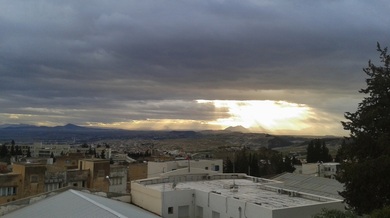
Crepuscular rays ago-go
I came down from the mountains and travelled through the verdant hills. My destination sat on a ridge on the southern edge of these fields and pastures, looking south over the badlands that came next. In the distance the sun and clouds played over cliffs, mesas and plateaus, casting crepuscular rays over the sort of landscape I’d always thought as more suited to the Maghreb. Le Kef was also a more traditionally Arabic town: the sprawl was all to one side of the walled Medina, which meant that you could walk out of some of its ancient gates and be in the countryside straight away, which gave you an interesting taste of how things were before.
Le Kef was right on the border of the North-South divide in Tunisia, which runs from here down to Sfax on the coast, about 100 miles to the south. The southern half is far poorer and also much more traditional. Headscarves start becoming a lot more common on women. Not everyone speaks French.
Whilst French isn’t universal in the North, almost everyone speaks it to some degree, and people who don’t speak any at all get teased by their friends. A lot of people are effectively bilingual, and switch back and forth, sometimes in the same sentence. By far the most common greeting in the North is “ ‘Assalama, ça va?” I’ve seen women admonish their child in French then switch back to Arabic to be more accommodating. At the very least, like nineteenth century Europe, it’s de rigueur to be au fait with French bon mots.
Le Kef was right on the border of the North-South divide in Tunisia, which runs from here down to Sfax on the coast, about 100 miles to the south. The southern half is far poorer and also much more traditional. Headscarves start becoming a lot more common on women. Not everyone speaks French.
Whilst French isn’t universal in the North, almost everyone speaks it to some degree, and people who don’t speak any at all get teased by their friends. A lot of people are effectively bilingual, and switch back and forth, sometimes in the same sentence. By far the most common greeting in the North is “ ‘Assalama, ça va?” I’ve seen women admonish their child in French then switch back to Arabic to be more accommodating. At the very least, like nineteenth century Europe, it’s de rigueur to be au fait with French bon mots.
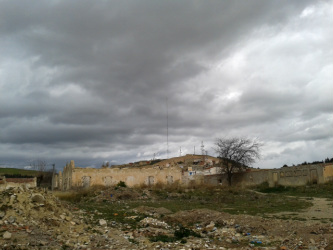
I have different aesthetic standards to many...
I had initially thought everyone was fluent, so whenever I didn’t understand someone I thought my French was at fault. I soon realised that the vast majority of people in the North were about at my level, and indeed, if I ever fluffed something I was saying I could see that most of them thought that they had been at fault for not understanding me. At the very least, they would speak much better French than I spoke Arabic, which meant I had hardly used Arabic at all, and in fact, could barely understand the dialect.
‘Ali was the first person I had a conversation with who spoke no French at all. As we sat on the minibus next to each other we quickly ran through the commonplaces I was relatively comfortable with, such as where I was from. He wasn’t to be dissuaded, though, and I was finally made to understand that he had a lot of love in his heart, that he wanted to welcome the world to Tunisia, but that the government made him cry, and so he hoped to go to Holland. I can’t swear to any of that, as a lot of it was helped along by sign language, and another passenger who looked like his patience was being severely tried when ‘Ali kept asking him for help to get his important message across.
As we walked from the bus station up to the old town, ‘Ali pointed to a heap of festering rubbish by the roadside and signalled that this was one of the things that made him cry. Tunisia wasn’t actually that filthy, compared to some countries I’d been to, but it was one of the things I’d wondered about whilst walking through the hills and seeing rubbish strewn liberally on the outskirts of a village. Why was I physically incapable of taking any pleasure in the multi-coloured waste dotted here and there like wildflowers? Was it because it wasn’t ‘natural’? Was it simply my cultural associations about litter and pollution? Could the Arab who happily chucks his rubbish out the window not see it as a problem because he didn’t mind all the crap that was building up? Did ‘Ali’s attitude reveal a fundamental truth in Tunisian culture, that rather than take responsibility for a problem, including the fact his own actions were contributing to it, he’d rather complain that the government wasn’t sorting it out for him? Or did it just show the dangers of extrapolating from one isolated incident and judging a whole culture on the basis of it?
‘Ali was the first person I had a conversation with who spoke no French at all. As we sat on the minibus next to each other we quickly ran through the commonplaces I was relatively comfortable with, such as where I was from. He wasn’t to be dissuaded, though, and I was finally made to understand that he had a lot of love in his heart, that he wanted to welcome the world to Tunisia, but that the government made him cry, and so he hoped to go to Holland. I can’t swear to any of that, as a lot of it was helped along by sign language, and another passenger who looked like his patience was being severely tried when ‘Ali kept asking him for help to get his important message across.
As we walked from the bus station up to the old town, ‘Ali pointed to a heap of festering rubbish by the roadside and signalled that this was one of the things that made him cry. Tunisia wasn’t actually that filthy, compared to some countries I’d been to, but it was one of the things I’d wondered about whilst walking through the hills and seeing rubbish strewn liberally on the outskirts of a village. Why was I physically incapable of taking any pleasure in the multi-coloured waste dotted here and there like wildflowers? Was it because it wasn’t ‘natural’? Was it simply my cultural associations about litter and pollution? Could the Arab who happily chucks his rubbish out the window not see it as a problem because he didn’t mind all the crap that was building up? Did ‘Ali’s attitude reveal a fundamental truth in Tunisian culture, that rather than take responsibility for a problem, including the fact his own actions were contributing to it, he’d rather complain that the government wasn’t sorting it out for him? Or did it just show the dangers of extrapolating from one isolated incident and judging a whole culture on the basis of it?
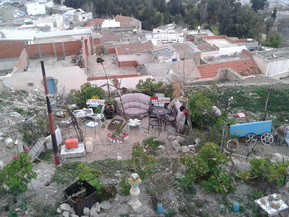
Le Kef’s medina tumbled haphazardly down the ridge in a series of steps that eschered their way back and forth. No matter which direction you started out in you’d always end up at the Kasbah, grumpily watching over the town and defiantly closed for the winter. Walking along the walls beneath it led to a curious site – a cross between some outsider art and what I presume was a café. Or maybe it was just a garden, filled with all the refuse that the government refused to take away, painted in garish colours and slogans of happiness and joy.
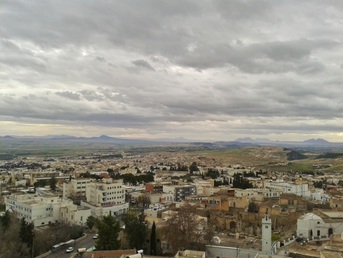
Check out the Roman Baths in the bottom right, next to the minaret...
Some of the other walls were carved with holes like a dovecot, for reasons I couldn’t fathom. The wind blew through them hard, a harmonica moaning and wheezing, giving the streets beside them an eerie, gothic feel. The town was ripe for ghosts: next to the spring that was the reason for its existence cafés spread around roman baths and cisterns.
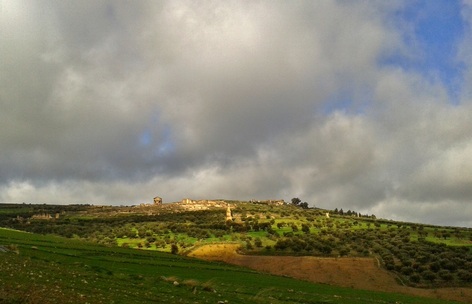
Yet I was after bigger fish. The next day I set off to visit Dougga, one of the best preserved roman sites in the world. It wasn’t too far to Nouvelle Dougga, an afterthought on the main road when they realised there was money to be made from the ruins and kicked their inhabitants out; an untidy grid of squalor, just about passing in the sunshine. Unfortunately, despite the sun’s brilliance, the wind had found an icy rain and was driving it in my face. As I stumbled up the road to the ruins, the wind hardened and rain ran horizontal through me. Dark clouds piled over the ridge. I hid behind an olive tree, which was totally inadequate in terms of providing shelter. The thought of a whole day in such weather was rather dampening my exuberance.
In between what I thought was the worst of the weather, I would make my way further up the hill and into the teeth of the next squall. It was only four kilometres, but they were fought metre by metre in an ugly struggle. I was soaked through, and could barely feel my feet and hands, but by and by the rain fell a little, the sun deigned to cast his fingers across the landscape, and I thrilled when I caught a glimpse of the ruins on the opposing hillside for the first time.
In between what I thought was the worst of the weather, I would make my way further up the hill and into the teeth of the next squall. It was only four kilometres, but they were fought metre by metre in an ugly struggle. I was soaked through, and could barely feel my feet and hands, but by and by the rain fell a little, the sun deigned to cast his fingers across the landscape, and I thrilled when I caught a glimpse of the ruins on the opposing hillside for the first time.
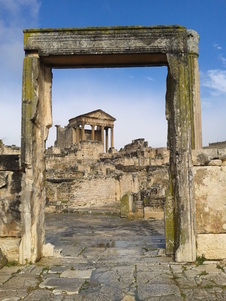
The ticket booth was fastened down hard, but at my approach a tiny window opened, and the guardian looked out in disbelief above his steaming tea. “You walked through that?” Still, once I was among the old walls and a little sheltered, I began to ignore my extremities and focus on the astonishing ruins around me. The city used to be Carthaginian, which is normally given as the explanation why it ignores the normal roman pattern of fascistic grids and instead creeps round the hillside in a tight weave of streets. The fact everything is so closely bound together means a lot of the walls have remained in fairly good nick, and the height differential means you can look down into the buildings from above. In all, it gives you a real feeling that you are actually in a town, and it’s easy to imagine what life was like there.
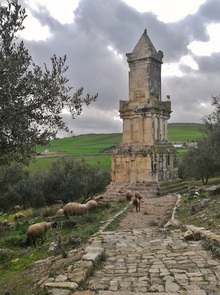
There’s the usual temples, theatres and bath houses, of course, but there’s also a genuinely massive brothel, and you can wander through the underground tunnels the slaves used to take so as not to offend their masters’ vision. The forum and market isn’t in bad shape, and you can saunter through the houses of both rich people and artisans. There’s a huge funeral monument from Punic times down among the olive groves, and there’s views across the wide agricultural valley to the mountains beyond. Every now and then a herd of goats will wander down a thoroughfare, and if you head through a triumphal arch then you reach the villas that have once again been requisitioned by the locals. They slap a roof on top and straight away you have a goatherd’s palace.
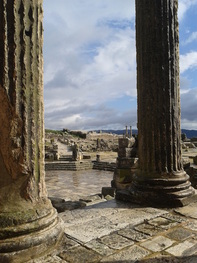
One of the grand spaces was entitled the place of the twelve winds: according to the guidebook no-one knows why the winds were given such prominence or what the square was used for. Although the weather had improved dramatically, and there were whole periods of sunshine between the fast moving clouds that danced overhead, I felt I had a fairly good idea. I hope I’m not alone in having always imagined the ancients living in a perpetual summer, a happy Mediterranean climate where they flounced around in togas that were white to reflect the sun. My go to image of roman life isn’t some poor, sodden bloke shivering in a toga that the rain has made transparent, splashed by mud and chilled to their very soul. There’s a reason that the romans invented central heating and were so fond of bath-houses. I wonder if the fact we often visit ruins on summer holidays affects our perceptions of classical civilisations, or perhaps it’s just me who was foolish enough to be blind to how often it must have been cold, wet and windy back then, even more often than it was now.
I managed to hitch a ride back down to Nouvelle Dougga, but I was taking no chances the next day, when I headed to a roman bath that was still in use. It was ten kilometres from the edge of town, but I wasn’t exactly sure where town ended, given its propensity to grow. The thought of walking for hours in the same conditions as yesterday was just too much, even if there was a prospect of a hot bath at the end of it.
I managed to hitch a ride back down to Nouvelle Dougga, but I was taking no chances the next day, when I headed to a roman bath that was still in use. It was ten kilometres from the edge of town, but I wasn’t exactly sure where town ended, given its propensity to grow. The thought of walking for hours in the same conditions as yesterday was just too much, even if there was a prospect of a hot bath at the end of it.
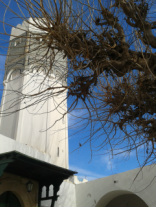
Looking Up!
I hired a guy in a pickup to take me. He cranked up the tunes and off we set. In fact, he cranked them up so loud that I had to hang my head out the window with a finger in my facing ear to stop it hurting. I can see why autotune has caught on out here, given that the digital artefacts and distortion is nothing compared to what you get when playing badly normalized music at such volumes through dodgy speakers. Still, the trip was lovely, if not restful, up through fields and over some rocky hills, along a gully to a small stone building on a bluff overlooking a lazy, greening river.
The bathhouse was isolated, which had no doubt helped save it, especially when combined with the fact it was fed naturally from hot springs. It was made from honey coloured sandstone, except when you got into the caldarium itself, where heavily worn marble steps led down to the shallow pool of ruddy water, giving off a faint ferrous smell and a gentle play of steam. It was fairly petite, with the pool being about five metres long and three across. The ceiling was arched and almost four metres above the water. At the top of the steps, where you came in, the room was lit through a small hole in a dome.
I got changed in a circular antechamber, then walked gingerly down into the steam. The water didn’t quite reach my knees, but was the absolute perfect temperature. It wasn’t the kind of hot that makes you pull your feet out and glower at the water, entirely sure that nothing delicate will stand that kind of punishment. Yet it was hot enough that when you lay out in it, your aches and even time itself begins to dissolve under its pressure. Lying there in the dull light, you could just make out the memories of bathers from centuries past, resting their weary bones after such a long trek.
After a few minutes, hours, days or years – it was hard to tell, my heartbeat a slowing metronome – my driver joined me, and gradually more and more locals started trickling in. It seems like chilling out isn’t entirely engrained into Tunisian culture, and soon the bath house was reverberating to the clatter of Arabic consonants, whilst they rubbed each other down and splashed merrily away. Luckily, by this point, the heat had shut down my reptilian brain, meaning response to stimuli was pretty much out of the question. I floated, eyes just above the surface, whilst plosives detonated and echoed around the stone arch and dome. The locals spoke a harsh colloquial, this wasn’t a tourist site for Gulf Arabs, and the scent of engine oil was melded to the water’s iron. It was nice to see that this was still just a local hangout, and I imagined the surrounding villagers taking great care of it over the centuries, making sure they didn’t lose their great treasure.
Eventually, around the turn of the century, I began to sit on the cool marble steps for periods, head above the steam, my body little more than the thudding of my heart, before returning to the welcoming, numbing warmth. This process was continued for millennia, until I could finally sit in the little antechamber and consider returning to the outside world. For the first time on my trip I had been deliciously, gloriously hot, and a return to the bluster of reality wasn’t the most pleasant prospect. The idea of hiding out in this refuge from time, beneath the mists that would hide me from untold conquerors and from want of anything but the earth’s cradling heat, was a beautiful dream, finally to emerge in the foreign country of the deep future with a Roman who’d been sequestered away there himself.
Still, when I got back to Le Kef and parted from my driver, I realised something had changed. The wind had stopped. There was an almost eerie calmness, after weeks of constant blowing. The clouds, confused at what to do with themselves now they were no longer pursued so mercilessly around the sky, began to break up and dissipate. As I sat outside a café that shared some steps with a mosque and an ancient fig tree, it was almost entirely blue above me. Down the steps and across the plains, a few angry hangers on scudded round the distant peaks, but the weather had come to peace with me, and let me be.
I wanted more of this. I wanted to be hot. This was better than the mountains, but I still needed to go South.
The bathhouse was isolated, which had no doubt helped save it, especially when combined with the fact it was fed naturally from hot springs. It was made from honey coloured sandstone, except when you got into the caldarium itself, where heavily worn marble steps led down to the shallow pool of ruddy water, giving off a faint ferrous smell and a gentle play of steam. It was fairly petite, with the pool being about five metres long and three across. The ceiling was arched and almost four metres above the water. At the top of the steps, where you came in, the room was lit through a small hole in a dome.
I got changed in a circular antechamber, then walked gingerly down into the steam. The water didn’t quite reach my knees, but was the absolute perfect temperature. It wasn’t the kind of hot that makes you pull your feet out and glower at the water, entirely sure that nothing delicate will stand that kind of punishment. Yet it was hot enough that when you lay out in it, your aches and even time itself begins to dissolve under its pressure. Lying there in the dull light, you could just make out the memories of bathers from centuries past, resting their weary bones after such a long trek.
After a few minutes, hours, days or years – it was hard to tell, my heartbeat a slowing metronome – my driver joined me, and gradually more and more locals started trickling in. It seems like chilling out isn’t entirely engrained into Tunisian culture, and soon the bath house was reverberating to the clatter of Arabic consonants, whilst they rubbed each other down and splashed merrily away. Luckily, by this point, the heat had shut down my reptilian brain, meaning response to stimuli was pretty much out of the question. I floated, eyes just above the surface, whilst plosives detonated and echoed around the stone arch and dome. The locals spoke a harsh colloquial, this wasn’t a tourist site for Gulf Arabs, and the scent of engine oil was melded to the water’s iron. It was nice to see that this was still just a local hangout, and I imagined the surrounding villagers taking great care of it over the centuries, making sure they didn’t lose their great treasure.
Eventually, around the turn of the century, I began to sit on the cool marble steps for periods, head above the steam, my body little more than the thudding of my heart, before returning to the welcoming, numbing warmth. This process was continued for millennia, until I could finally sit in the little antechamber and consider returning to the outside world. For the first time on my trip I had been deliciously, gloriously hot, and a return to the bluster of reality wasn’t the most pleasant prospect. The idea of hiding out in this refuge from time, beneath the mists that would hide me from untold conquerors and from want of anything but the earth’s cradling heat, was a beautiful dream, finally to emerge in the foreign country of the deep future with a Roman who’d been sequestered away there himself.
Still, when I got back to Le Kef and parted from my driver, I realised something had changed. The wind had stopped. There was an almost eerie calmness, after weeks of constant blowing. The clouds, confused at what to do with themselves now they were no longer pursued so mercilessly around the sky, began to break up and dissipate. As I sat outside a café that shared some steps with a mosque and an ancient fig tree, it was almost entirely blue above me. Down the steps and across the plains, a few angry hangers on scudded round the distant peaks, but the weather had come to peace with me, and let me be.
I wanted more of this. I wanted to be hot. This was better than the mountains, but I still needed to go South.

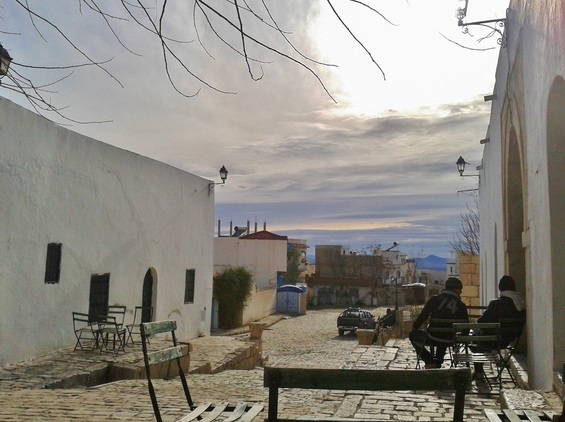
 RSS Feed
RSS Feed
